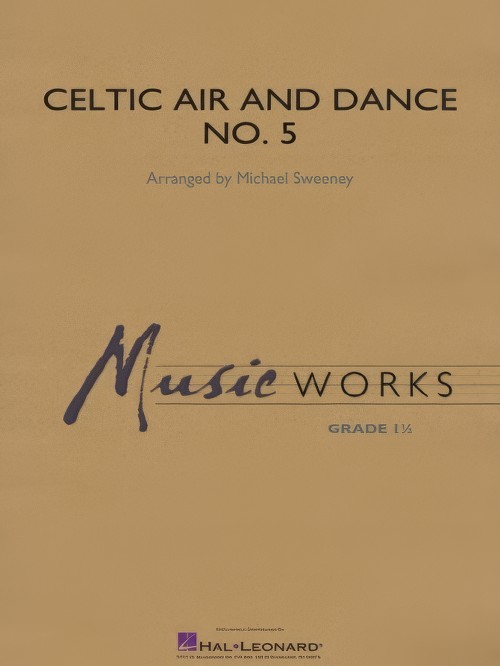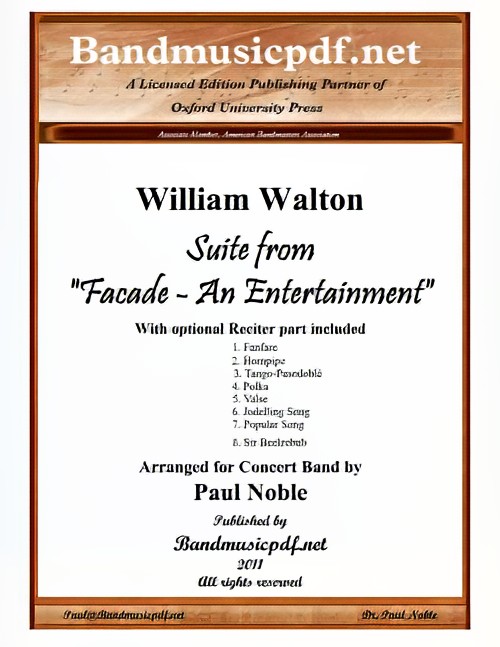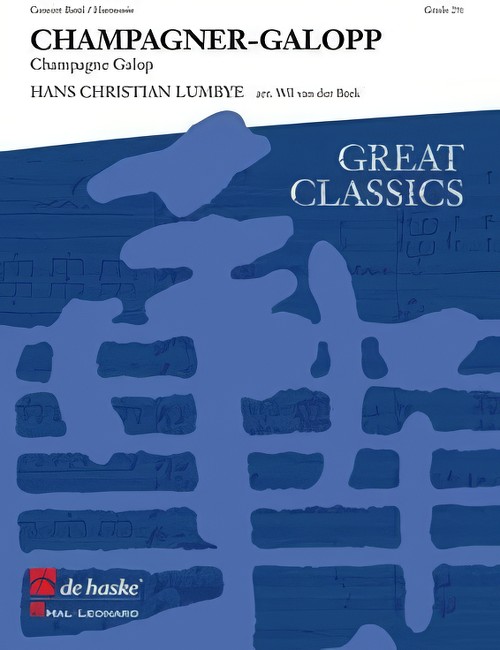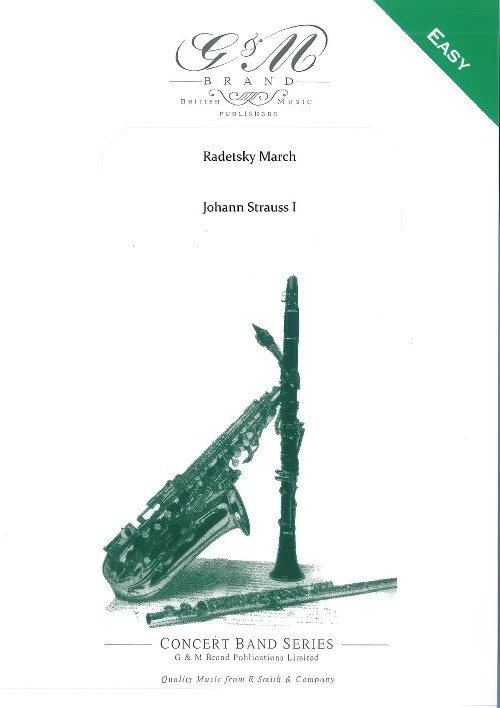Results
-
£49.60
ZWEI EMMENTALER POLKAS - Traditional - Fraser Bruce
Estimated dispatch 7-14 working days
-
£24.60
ZWEI EMMENTALER POLKAS (Partitur/Score) - Traditional - Fraser Bruce
Estimated dispatch 7-14 working days
-
 £53.50
£53.50Celtic Air and Dance No.5 (Concert Band - Score and Parts) - Sweeney, Michael
Continuing the popular format of previous Celtic Air and Dance settings, this work for second year players opens with the tender Irish ballad "Ned of the Hill." The dance segment combines two popular Irish polkas with the melodies skillfully traded between various sections of the band. Perfect for teaching both legato and detached styles, and also keeping the percussion engaged.
Estimated dispatch 7-14 working days
-
 £375.00
£375.00Facade - An Entertainment, Suite from (Concert Band with Optional Narrator - Score and Parts) - Walton, William - Noble, Paul
This Suite from Facade - An Entertainment, composed by William Walton, with poems by Dame Edith Sitwell, presents for the first time a grouping of movements selected and arranged by Paul Noble for Concert Band and optional Reciter. The original composition was written between 1921 and 1928, containing forty-three numbers. They had their origin in a new style of poetry that Edith Sitwell evolved in the early 1920s, poems that her brother Osbert later described as 'experiments in obtaining through the medium of words the rhythm and dance measures such as waltzes, polkas, foxtrots... Some of the resulting poems were sad and serious... Others were mocking and gay... All possessed a quite extraordinary and haunting fascination.' Possibly influenced by the dance references in some of the numbers, Osbert declared that the poems might be further enhanced if spoken to a musical accompaniment. The obvious choice of composer was the young man who lived and worked in an attic room of the Sitwell brothers' house in Carlyle Square W[illiam] T[urner] Walton, as he then styled himself. The now historic first performance of the Facade Entertainment took place in an L-shaped first-floor drawing-room on January 24, 1922. Accompaniments to sixteen poems and two short musical numbers were performed by an ensemble of five players. The performers were obscured from the audience by a decorated front curtain, through which a megaphone protruded for Edith to declaim her poems. This was, as she put it, 'to deprive the work of any personal quality'. The first public performance of Facade was given at the Aeolian Hall on June 12, 1923. By now, fourteen poems had been set, others revised or rejected, and an alto saxophone added to the ensemble. The occasion gave rise to widespread publicity, both pro and contra, and the name of the twenty-one year old W. T. Walton was truly launched. In the ensuing years the Facade has gone through revisions and additions, with full orchestral arrangements of selected movements being made without the Reciter. Former Band Director Robert O'Brien arranged some movements for band, again without Reciter, which are now out of print. So this 'history making' addition is the first opportunity for Concert Bands to present some movements of Facade with poems as originally intended. The luxury of electronic amplification allows the full ensemble to perform without necessarily overshadowing the Reciter. And the arrangements are written with considerable doubling so that the ensemble may play in full, or reduced in size as may be desired for proper balance. And, though not encouraged, the arrangements are written so that the band can perform the music without the Reciter. Program notes are adapted in part from those written by David Lloyd-Jones and published by Oxford University Press in the Study Score of William Walton's Facade Entertainments.
Estimated dispatch 7-14 working days
-
 £72.99
£72.99Champagner-Galopp (Champagne Galop) (Concert Band - Score and Parts) - Lumbye, Hans Christian - Van der Beek, Wil
Hans Christian Lumbye was born in Denmark in 1810 and has become known for his many light-hearted and airy works, most commonly waltzes, galops, polkas, mazurkas and marches. The Champagne Galop is without doubt one of the most performed works of this master from the North.Duration: 2:20
Estimated dispatch 7-14 working days
-
 £84.99
£84.99Bahn Frei (Concert Band - Score and Parts) - Strauss, Eduard - Van der Beek, Wil
Eduard Strauss, the third son of Johann Strauss the Elder, was born on March 15, 1835, in Vienna. Originally, Eduard looked for employment in the diplomatic service, but he also studied music theory. He became a harpist in the Strauss orchestra in 1855. In 1862, he joined his two famous brothers Johann Jr. and Josef as a conductor of the family orchestra. Like that of his two brothers, his musical output was prolific: he wrote over 320 separate dances and marches. Apart from the exuberant Bahn Frei (Track Clear), which he wrote in 1869, and a handful of other fast polkas (he excelled in this particular dance form), his music is not as well known as that of his brothers.Duration: 3:00
Estimated dispatch 7-14 working days
-
 £49.95
£49.95Radetsky March (Concert Band - Score and Parts) - Johnson, Stuart
Probably the most famous piece by Johann Strauss the elder. His other clai to fame was as the father of three sons, all composers, of who the middle son (also Johann) was to become world famous for his Waltzes and Polkas. Duration 3:30
Estimated dispatch 7-14 working days
-
 £9.95
£9.95Radetsky March (Concert Band - Score Only) - Johnson, Stuart
Probably the most famous piece by Johann Strauss the elder. His other clai to fame was as the father of three sons, all composers, of who the middle son (also Johann) was to become world famous for his Waltzes and Polkas. Duration 3:30
Estimated dispatch 7-14 working days
-
 £59.40
£59.40Kinizsi (Concert Band - Score and Parts) - Fucik, Julius
Julius Fucik was the king of Czech music, composing many marches, waltzes, polkas, and other light works, and is most famous for his "Entrance of the Gladiators" and "Florentiner" marches. His Hungarian march "Kinizsi", named for the famous Hungarian military hero, is a powerful symphonic march for mature bands. Impressive and unique!
Estimated dispatch 7-14 working days
-
 £60.99
£60.99Nun geht es los (Concert Band - Score and Parts)
Nun geht es los, meaning "off we go," is a spirited polka taken from the most recent CD of concert band music released by well known band leader, Michael Klostermann and his musicians. Amongst a marvellous selection of polkas, waltzes and marches, Nun geht es los (Let's get started) stands out as an exceptional piece. Ideal to play as a concert opener!
Estimated dispatch 7-14 working days
